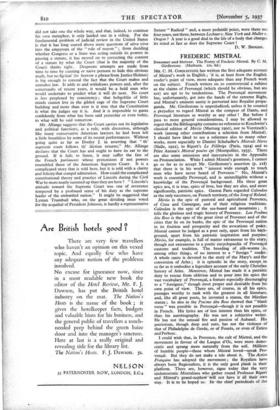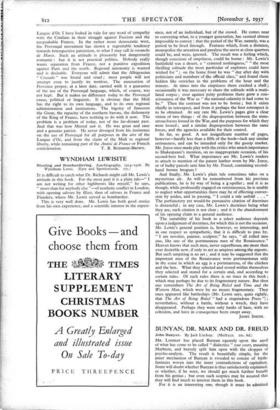FREDERIC MISTRAL
MR. C. M. GIRDLES-DONE has written the first adequate account• of Mistral's work in English ; it is, at least from the English
reader's point of view, more adequate than any French work on the subject. French writers on so controversial a subject as the claims of Provencal (which should be obvious, but are not) are apt to be tendentious. The Provencal movement has, unfortunately, got into the hands of the extreme Right, and Mistral's eminent sanity is perverted into Royalist propa- ganda. Mr. Girdlestone is unprejudiced, unless it be counted a prejudice to regard Mistral as the compeer of Dante, and Provençal literature as worthy as any other ! But before I
pass to more general considerations, I may be allowed to regret that the Bibliography contains no reference to Koschwitz's classical edition of Mireio (Marturg 1900), nor to Voretzsch's work (among other contributions a selection from Mistral). I should have liked to see a reference also to many other works, more especially to Dimitri Scheludko's Mistrals Nerto (Halle, 5922), to Ripert's Le Felibrige (Paris, 1924) and to Peire Azema's Mistral potato epi (Montpellier, 1933). There are also some omissions and inaccuracies in the Appendix on Pronunciation. While I admit Mistral's greatness, I cannot go so far as to accept Mr. Girdlestone's assertion (p. 218) that there is in his work " interest wide enough to touch men who have never heard of Provence." No, Mistral's work is essentially Provençal, and is unintelligible without a knowledge of the Provencal background. His three great epics are, it is true, epics of love, but they are also, and more significantly, patriotic epics. Gaston Paris regarded Calendau as the only successor, on French territory, of the Song of Roland.
Mireio is the epic of pastoral and agricultural Provence, of Crau and Camargue, and of their religious traditions. CaIendau is the epic of the sea-board and mountains ; It tells the glorious and tragic history of Provence. Lou Pouttmo ddu Rose is the epic of the great river of Provence and of the cities that lie on its banks, the epic of the Provencal nation in its fruition and prosperity and the avocations of peace. Mistral cannot be judged as a poet only, apart from his back- ground, apart from his patriotic inspiration and purpose. Mireio, for example, is full of matter extraneous to the story, though not extraneous to a poetic encyclopaedia of Provencal customs and tradition. The breeding of silk-worms As, among other things, of no interest to a " foreign " reader: A whole canto is devoted to the story" of the Mary's and the conversion of Arles ; it is episodic in the story, except, in so far as it embodies a legendary account of the early Christian history of Arles. Moreover, Mistral has made it a patriotic duty to rescue from oblivion and to pour into his epics the vast vocabulary of Provencal, a feature especially discouraging to a " foreigner," though most proper and desirable from -his own point of view. There are, of course, in all his epics, passages worthy to rank with the greatest in all literature, and, like all great poets, he invented a stanza, the Mirelian stanza ; he also in the Pouemo ddu Rose showed that "blank verse " was possible in Provencal—though it is not possible in French. His lyrics are of less interest than his epics, , or than his autobiography. He was not a subjective writer. He has not the sensual fire and passion of Aubanel. His patriotism, though deep and sure, has not the violence of that of Philadelphe de Gerde, or of Foures, or even of Estieu and Perbosc.
I could wish that, in Provence, the cult of Mistral, and the movement in favour of the Langue d'Oc, were more demo- cratic and sprang more naturally from the soil. Millions of humble people—those whom Mistral loved—speak Pro- vencal. But they do not make a tale about it. The Action Franoise has adopted the movement ; the Royalists have always been Regionalists, it is the only good plank in their platform. There are, however, signs today that the very undemocratic Mistralians who gather round Professor Ripert and Mistral's grand-nephew will not have it all their own way. It is to be hoped so. In the chief periodicals of the Langue d'Oc I have looked in vain for any word of sympathy with the Catalans in their struggle against Fascism and the unspeakable Franco. In the rather more democratic west, the Provencal movement has shown a regrettable tendency towards tetrospective patriotism, to what I may call la revanche de Muret. Such an attitude is pleasantly but dangerously romantic : but it is not practical politics. Nobody really wants separation from France, nor a punitive expedition against Paris and the north. Regional autonomy is wanted and is desirable. Everyone will admit that the Albigensian " Crusade " was brutal and cruel ; most people will not attempt even to justify its motives. The annexation of Provence proper, at a later date, carried with it a guarantee of the use of the Provencal language, which, of course, was not kept. But it makes no difference today to the Provencal cause, political or linguistic. It is obvious that the Midi has the right to its own language, and to its own regional administration and institutions. The bigotry of Innocent the Great, the rapacity of the northern barons, the dishonesty of the King of France, have nothing to do with it now. The problem is a problem of today, not of the far-distant past. And that was how Mistral saw it. He was great and sane and a genuine patriot. He never diverged from his insistence on the use of Provencal for all purposes in the aire of the Langue d'Oc, and from the claim of the Midi to regional liberty, while remaining part of the Amide de France or French















































 Previous page
Previous page